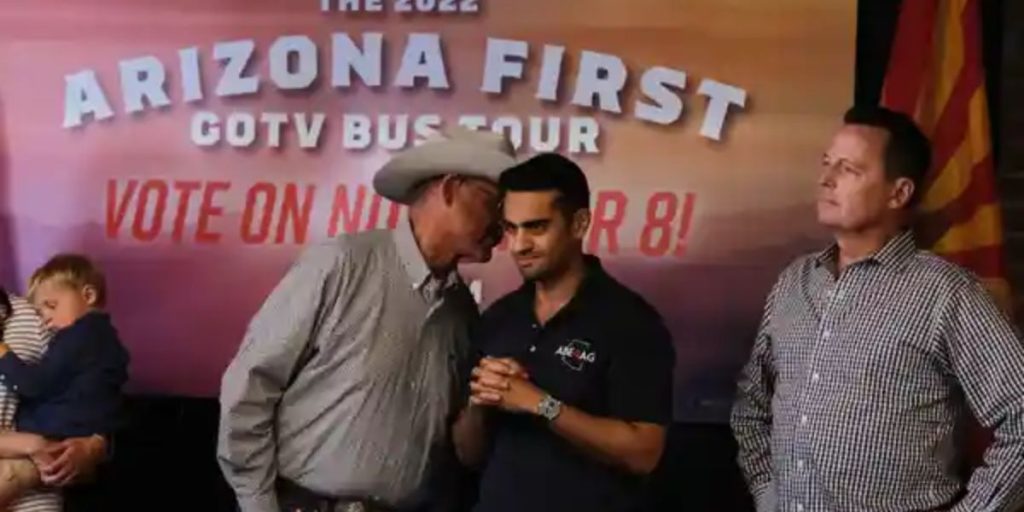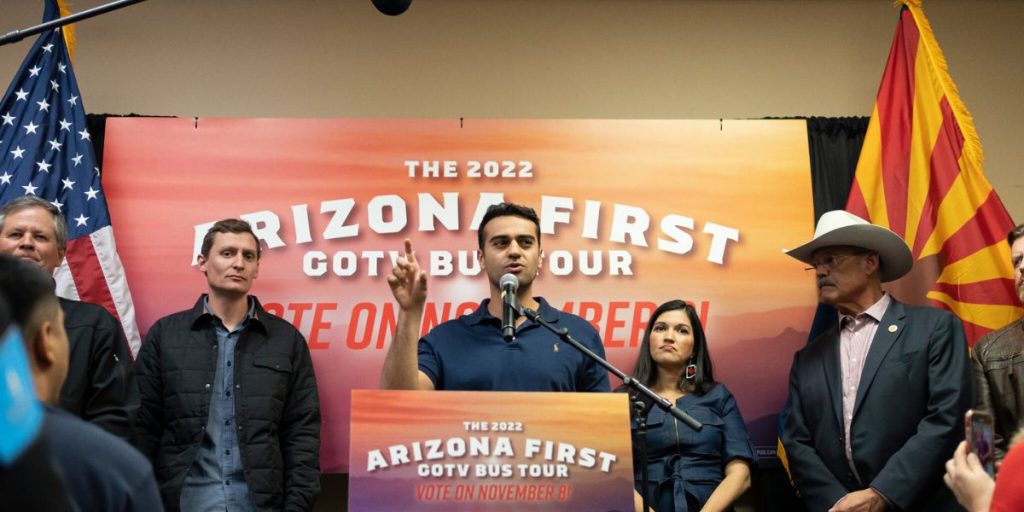Attorneys for Republican legislative leaders want a federal judge to suppress – or at the very least dismiss – testimony from a former Democratic legislator alleging racially motivated comments made by current Majority Leader Sonny Borrelli.
Kory Langhofer did not contend in court that the Lake Havasu City Republican made the comments to then-Sen. Martin Quezada. According to Quezada, the comments were “one offensive thing after another.”
More importantly, Quezada claimed that Borrelli claimed dead persons and “illegals” were being registered to vote.
“If your people weren’t doing that, we wouldn’t have to bring these bills,” he said, quoting Borrelli.
Langhofer’s allegation instead is that the entities opposing the two 2022 bills, including the US Department of Justice, failed to notify that Quezada would be testifying about his meetings with Borrelli.
Langhofer claimed that this denied him and other state attorneys the opportunity to question Quezada before he testified. And that, he claims, is “gamesmanship.”
However, Ernest Herrera, an attorney with the Mexican American Legal Defense and Educational Fund, contended that Quezada was on the state’s list of witnesses to be summoned. And it is the fault of the lawyers defending the laws that they did not question him ahead of time to find out what he may say.

What makes all of this relevant is that a number of civil rights organizations, as well as the US Department of Justice, have asked U.S. District Court Judge Susan Bolton to overturn a pair of laws passed by the Republican-controlled Legislature in 2022 that they claim were specifically designed to discourage minorities from voting.
Top Republican officials supporting the measures say they are simply common-sense changes to ensure that only individuals who are eligible to vote can vote. That is contested by challenges.
But whether Bolton determines they were enacted with “discriminatory intent,” which would violate the federal Voting Rights Act, could be the deciding factor in the case. And testimony concerning what Borrelli stated could contribute to the construction of that case.
“I said no such thing,” replied Borrelli to Capitol Media Services. “He is either hallucinating or completely fabricating for political gain, period.”
Nonetheless, Borrelli stated that he had neither seen nor heard exactly what was said by Quezada, who is no longer a state senator after declining reelection in 2022 to run unsuccessfully for state treasurer.
“I’ve heard he said things,” Borrelli added, declining to comment further.
There are numerous clauses in both legislation. Bolton has previously banned the state from enforcing one that states that only those who provide proof of citizenship can vote for president.
While politicians are free to establish specific qualifications for state and local elections, the National Voter Registration Act states that anyone who completes a form designed by the Election Assistance Commission is eligible to vote in federal elections. That form merely requires applicants to sign a sworn statement under penalty of perjury stating that they are, in fact, citizens.
Several more concerns are still outstanding. One would force county recorders to report the names of anyone suspected of attempting to register without being citizens to the attorney general.
Challengers argue that referral can be based purely on the recorder’s inability to discover these names in certain databases. They further claim that using those databases “amounts to intentional race, national origin, and alienage discrimination.”
The constitutionality of a new need for persons to give documentary proof of residency – where they live — in addition to what was already required has yet to be determined.
All of this points to the question of whether Republican lawmakers had a genuine — and non-racial — reason to pass the bill.
The challengers contend otherwise.
“The proof of citizenship restriction continues a baseless assault on Arizona’s elections based on a conspiracy theory that non-citizens are voting, despite a persistent lack of credible evidence to support such claims,” according to the lawsuit. “It is the newest in a series of cynical and bad faith attempts to use these politically motivated and false allegations to limit access to voting by eligible, lawful citizens.”
Mark Brnovich, the attorney general at the time, supported the laws. However, Kris Mayes, who assumed office in January, did not support all of the provisions.
So House Speaker Ben Toma, R-Peoria, and Senate President Warren Petersen, R-Gilbert, petitioned Bolton for permission to intervene and defend both statutes. They further denied that the laws were intended to target voters of color.
That then leaves it to Bolton to decide whether there was a racial motive behind the law — and why what Quezada has to say could be relevant and should be considered as evidence.
“The substance of my testimony was really about the technical aspects of the bill, what it did, why it hurt people, why it was bad, and why it hurts certain communities like my own,” Quezada said in an interview with Capitol Media Services.

Quezada said he spoke about what he saw as prior measures by the Republican-controlled Legislature to suppress minority voting in Arizona and how judges in other cases have said they have a disparate impact on communities of color.
However, this prompted attorneys for the challengers to question him about comments made by other senators about why they had passed such legislation. And Quezada, who sat next to Borrelli on two committees, said he heard a lot from him.
“There were times when he talked about, ‘Well, this is because there are people in your area that are committing these crimes,'” he was quoted as saying Borrelli told him, things like “registering dead people or people coming across the border and voting.”
“If your people weren’t doing that, we wouldn’t have to bring these bills,” he said, quoting Borrelli.
Quezada said he told the court these kinds of comments weren’t unique. He also said he testified at one point Andy Biggs, who was the president of the Senate at the time, made Borrelli go to Quezada’s office “and apologize for some of the offensive things he said.”
“And I remember that vividly because he came into my office and apologized — and then went off to say other offensive things on top of that,” Quezada went on to claim.
Borrelli said that never happened.
What makes the testimony inadmissible, Langhofer told the judge, is the challengers, in disclosing their witness list, “opaquely described Quezada’s testimony as ‘information regarding the challenged laws, including the origin, funding, sponsorship, merit, legality, lobbying, support, and legislative history.’”
Only when Quezada was on the stand, Langhofer said, did the attorneys for the challengers question him about conversations he said he had with Borrelli — conversations that were not disclosed to attorneys for Petersen and Toma.
Langhofer said federal rules prohibit a party from using information that was not provided in advance. So he wants Bolton to not just ignore it but also strike it from the record.
Herrera, from MALDEF, said the fact Langhofer and others were taken by surprise is their own fault, saying he was disclosed before trial as a “person with information.”
“Intervenors had time to notice Mr. Quezada for a deposition — depositions proceeded until close to the time of trial — but they did not do so,” Herrera said to the court. He said it was clear that the witnesses being called by challengers to provide information on “legislative intent, including inquiries about the involvement of particular legislators and third parties in the passage of the challenged laws.”
Bolton has not said when she will rule.
All this comes as Toma and Petersen lost their own bid to refuse to answer questions from challengers about their backing of both bills. Both objected, arguing that would violate the concept of “legislative privilege” which generally says lawmakers need not answer questions about their thinking.
But Bolton ruled — and the U.S. Supreme Court agreed — that the information sought goes to the heart of the constitutionality of the law.
“Motive is most often easily discovered by examining the unguarded acts and statements of those who would otherwise attempt to conceal evidence of discriminatory intent,” she said.

